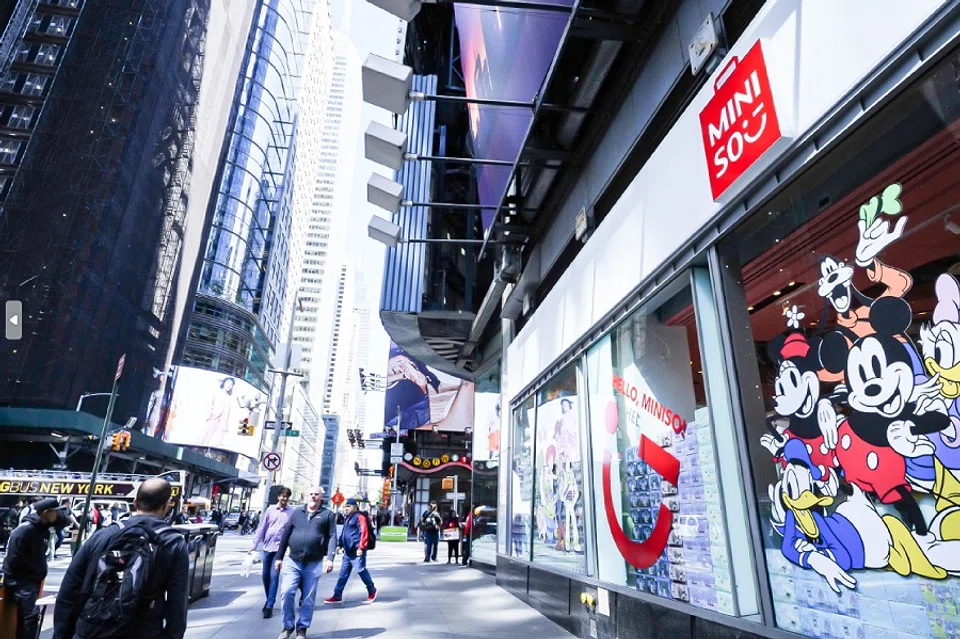Is Chinese retailer Miniso's 400% stock rally sustainable?
A 400% price jump in the past year has made Miniso Group Holding Ltd. the best-performing stock on the Nasdaq Golden Dragon China Index. Zaobao journalist Lee Kuo Ai speaks to Robin Liu, chief marketing officer of lifestyle brand Miniso, to find out more about the secret behind its stellar stock price rise, how IP collaborations have helped it to turn in strong performances within and outside of China, and how it plans on tackling the challenges ahead.

Commenting on the jump in stock price, Miniso's chief marketing officer Robin Liu said it was an indication of investors' recognition of the retail chain. While declining to comment on the stock price trend, he emphasised that Miniso has a good understanding of its positioning after years in business, and has also developed a clearer business and product strategy this year.
Liu said Miniso's brand identity is to create a trendy lifestyle brand centred on designs with IP (intellectual property) rights, offering high-cost-performance products that are attractive, fun, and useful for consumers. He said, "If we only leverage on cost, we would not be able to match up to new challenges and competition. We must compete on both cost advantage and product differentiation to stand out."
More than 5,700 stores globally
Miniso relies on expanding to fight for market share. As of end June 2023, it operates more than 3,600 stores in China, and more than 2,100 stores overseas.
According to Miniso's Q4 performance for the fiscal year ending June 2023, overseas markets accounted for 40% of operating profit for the latest quarter, up from 25% for the previous quarter.
Liu said: "As the operating leverage of our regular chain stores increases, profitability for overseas operations also significantly increases, especially in the US market. In June, nearly 90% of US stores were profitable, which helped to drive overall profits for overseas operations.

"Even though competition in international markets is not nearly as fierce as it is in China, Miniso does not yet have a direct rival there. Our overseas operations also benefit fully from China's supply chain advantage."
Setting up mega stores
On the differences between the Chinese and overseas markets, Liu said: "There's a difference in economic cycles, consumer habits and willingness to consume. For example, China is in the midst of a slow economic revival, but foreign markets have generally recovered quickly. At the same time, given the higher levels of consumption overseas, Miniso product prices are comparatively cheaper and people are more willing to buy."
Liu thinks that Miniso has the potential for rapid growth in the global market, and now is the best time for Miniso to go international and become a real global enterprise.
In its overseas expansion, mega stores, or flagship stores of 500 to 1,000 square metres, are a focus. Regular Miniso stores are less than 200 square metres. One example would be New York Times Square's Miniso mega store opened in May. Though rent is more expensive, the revenue brought in by this flagship store in the first 30 days of operation hit US$1.32 million.
Liu said: "In the past, our China stores averaged around 300,000 RMB in sales per month. That is to say, for mega stores like the one at Times Square, its monthly revenue could be 30 times that of the average sales figure of a store in China."

Besides the flagship store in New York, Miniso also tried setting up mega stores in China this year. In early February, it opened a stand-alone three-storey flagship store of more than 1,000 square metres in Chunxi Road, the busiest commercial street in Chengdu.
In the second half of June, Miniso opened a 1,000 square metre flagship store in Guangzhou's Beijing Road Pedestrian Street; from this store alone, Miniso reaped 4.66 million RMB (US$636,800) and 5.13 million RMB in sales in July and August.
Liu said: "Looking at past figures, it is very rare for us to exceed 2 million RMB in monthly sales. We never thought we could hit 4 million RMB, much less 5 million RMB. The mega store concept has given us a lot of confidence."
Self-promoting IP products series and blind boxes
Besides its large size, Liu also shared how Miniso catches the eye of consumers by working with IP partners to create special themes for their stores. For example, Miniso collaborated with Disney to design the facade of their Guangzhou store with Pixar's Summer Baking Fest theme. Such a unique exterior made it a favourite among netizens and a destination to "check-in".

Liu commented that during that period, fans and customers alike would come to the store to "check-in". "We have a wide variety of products selling at very reasonable prices. Customers do not leave empty-handed at our stores. They would generally buy some Miniso products.
"Mega stores are not only large in size with a wide range of products but also embody our IP strategy. We hope that they possess media-esque attributes, or what we call end-spectrum mediatisation, with each store producing its own content and talking points, capable of self-promotion on many fronts. Such ever-changing promotions can draw in new customers and viewership. In this way, our marketing costs can be reduced as well."
During the interview, Liu stressed at least five to six times how Miniso's IP strategy was an important part of the brand's strategy. He cited the examples of three successful IP series Miniso introduced in July and August that got better responses than expected: the Pixar series, the Barbie film series and the Peanuts comic series.

Miniso launched the Barbie product range around 21 July, a few days prior to the world premiere of the movie. Liu said, "The Barbie product range exceeded our expectations. Basically, many items were sold out within three days of the launch, and we later placed repeat orders. The overall value of products was about 2.5 times more than what was originally planned.
"Then in mid-August, we launched the Snoopy product range, which is another classic series. Although we didn't invest heavily in the marketing campaign, it still has the second-highest sell-through rate in the given period."
He said, "It has been seven years since we began our IP strategy in 2016. We have tasted the benefits of IP and believe that it can give us competitive differentiation from similar brands."

Launching marketable and popular products is also part of Miniso's business optimisation plan. The blind box (盲盒, mystery box of unusual figurines) is one such product type whose sales performance has also surprised Miniso recently. The company went on to organise the first blind box festival for its Chinese market during the recent summer vacation.
Blind boxes have also caught on with the American youths. Liu said, "Although this is a new product type, blind boxes have quickly gained a larger share of the US business, exceeding 10% of sales in our US stores, and hitting 20% in some stores."
Analysts: Miniso's stock has become expensive
As of the fiscal year 2023 ended 30 June 2023, Miniso's revenue from China grew 39.4%, its number of stores increased 9%, and its average revenue per store also jumped 31%. At the same time, revenue from overseas markets also hit a new record, growing 42% year-on-year, with an 11% increase in the number of stores. However, the average revenue per store has yet to fully return to pre-pandemic levels.
Miniso's adjusted basic and diluted earnings per American depositary share (ADS) were both US$0.25 in this quarter, a year-on-year increase of 150%. Its revenue also increased 40.3% to US$448.5 million. Overall, Miniso's revenue and net profit have exceeded analyst expectations for nine consecutive quarters. As of this quarter, Miniso's cash flow also reached US$1 billion.
Besides distributing a cash dividend of US$0.41 per ADS for the June quarter, the board of directors has approved a new share repurchase programme to repurchase up to US$200 million of shares over a period of 12 months starting mid-September, highlighting the company's financial strength.

However, after this bout of soaring stock prices, some market analysts are starting to feel that Miniso's stock is getting expensive.
The latest data from S&P Global Market Intelligence showed that Miniso's price-earnings ratio was 39.06 based on its stock price as of 1 September. In comparison, the price-earnings ratio of other China concept stocks such as PDD Holdings and Alibaba Group Holding Ltd was 26.46 and 21.43 respectively. In this sense, how can Miniso push up its ADS to justify its price-earnings ratio in future?
... while world-famous IPs can indeed expose Miniso to the world and quickly earn it a greater market share, to some extent this also blurs Miniso's branding.
Opportunities and hidden worries
Behind Miniso's stellar performance lies some hidden worries. Its IP strategy, for one, is a double-edged sword. In the short term, while world-famous IPs can indeed expose Miniso to the world and quickly earn it a greater market share, to some extent this also blurs Miniso's branding.
While Miniso's blind boxes are performing well, the blind box market has attracted the attention of regulatory departments who wish to tighten their grip on this red-hot industry veering towards speculation.
For example, China bans merchants from selling medicine, medical equipment, live animals and flammable and explosive objects in blind boxes. It also prohibits the sale of these boxes to minors under the age of eight and urges vendors to keep minors from becoming addicted to purchasing blind boxes. Singapore also limits the value of prizes in blind boxes to under S$100. So, the blind box market may not necessarily stand out in the future.
Can Miniso also create products that drive trends? This will be the major challenge.

At the same time, Miniso is often mistaken for a Japanese brand and had been criticised as a "copycat" in the past. While it completed its "de-Japanisation" process in March this year, it still has much to do before it can be completely rid of its Japanese branding. After all, eradicating this impression will not happen overnight.
While Miniso is now riding on "little blessings" and is seemingly on an ascending path towards bigger success, it is uncertain whether its momentum can be sustained. Product models of this industry with a low price tag and limited profits often lack macro thinking. Ultimately, trends cannot always drive new products. Can Miniso also create products that drive trends? This will be the major challenge.
This article was first published in Lianhe Zaobao as "名创优品400%经济学 开架潮品正当时".





![[Photos] Fact versus fiction: The portrayal of WWII anti-Japanese martyrs in Taiwan](https://cassette.sphdigital.com.sg/image/thinkchina/3494f8bd481870f7c65b881fd21a3fd733f573f23232376e39c532a2c7593cbc)